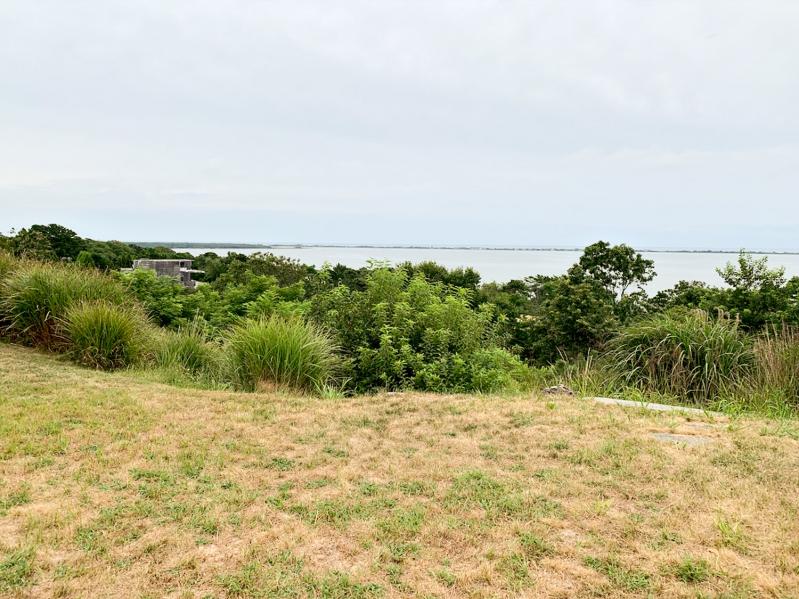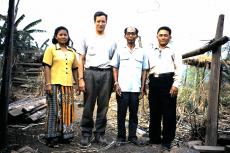One year after a landmark deal in Southampton returned Shinnecock Nation burial grounds to the tribe, New York State stands poised to enact two bills that would further honor Long Island’s Indigenous populations. One would grant the Montaukett tribe its long-sought state recognition while the other would ensure that unmarked burial remains in the state are honored and preserved. The bills await Gov. Kathy Hochul’s signature after passing through the State Legislature this year.
“The common thread between the two bills is that they right historic wrongs as to how Native Americans have been treated in this country,” said State Assemblyman Fred W. Thiele Jr., who sponsored the Montaukett bill and co-sponsored the burial-remains legislation introduced by fellow Long Island assemblyman Steven Englebright.
“In the case of the Montaukett bill, it would restore recognition of their tribal government that was taken away a century ago. It’s simply a matter of returning the dignity of the Montauketts. And it’s the same with regard to the burial bill,” added Mr. Thiele. “The remains of Native Americans have been treated as less than human — and this is all about restoration of dignity for Native American people.”
Mr. Thiele was optimistic that Governor Hochul would sign the Montaukett bill but less certain about the prospects for the unmarked burial bill, which would compel developers or homeowners to preserve remains or funerary items that may be uncovered during home construction or renovation.
“As far as any development project on Long Island, or particularly in Montauk, the impact of the unmarked burial bill, regardless of [recognition of] the Montauketts, is that landowners and developers will have to be responsible in seeking to develop the land,” Mr. Thiele said.
“There will be a procedure to ensure that remains and funerary objects, that there will be a process for searching for them, identifying them, and providing for them to be dealt with and returned in a dignified way. That will be the case for all Native American people, regardless of whether they have state recognition itself. From the perspective of the landowners, they’ll know what the rules are, they’ll have to be respectful of them.”
Mr. Thiele proposed similar legislation in Albany in past legislative sessions but those efforts ran into opposition from a real-estate and developers’ lobby that is also a main source of Governor Hochul’s campaign cash. According to campaign-finance reports in the Real Deal publication and elsewhere, Ms. Hochul, who is running against Representative Lee Zeldin this year, had raised more than $300,000 from real estate interests by January of this year.
“I’ve cosponsored the unmarked burial bill for the better part of a decade,” Mr. Thiele said, “and it’s just never moved. There has been opposition from developers and real estate interests who
thought passing this bill and passing protocols [for developer and homeowners] would put too much of a burden on a development process that’s already too long — and that’s part of the reason it hasn’t moved.”
Mr. Thiele also said that the bill “only started to move in the last week of the session,” which ended on June 2. “We made personal pleas for the legislation and that plea was satisfactory, though I will acknowledge that we might have snuck up on the opposition this year,” Mr. Thiele said. Both bills sailed through the Legislature with overwhelming support in the Assembly and Senate.
Mr. Thiele also highlighted that the Sugar Loaf deal put renewed focus and pressure on New York State lawmakers — one of only four states without an unmarked burial law — to pass the bill. Last year, the Shinnecock Nation worked with the Peconic Land Trust and the Town of Southampton (and Pink Floyd’s Roger Waters) to secure $5.6 million and purchase the so-called Nappa property atop Sugar Loaf hill in the Shinnecock Hills. The town came up with most of the capital while Mr. Waters, a Bridgehampton resident, contributed $300,000 for the purchase.
The house on top of Sugar Loaf hill has since been demolished, said the Peconic Land Trust founder and executive director, John Halsey, and all that’s left is to remove a swimming pool and the basement. Mr. Halsey expects the site will be safe to access within two months, “and then the question will be how the property will be made safe for what’s there because there’s remains — it’s important that they get protected, and also important that the public gets to learn and understand the significance of the site. Sugar Loaf is the most sacred of the sites” in Shinnecock Hills, Mr. Halsey said.
“The deal calls for an opportunity for people to go up there and get a view and see it for themselves.”
Ground-penetrating radar (GPR) will continue to be deployed to find funerary and burial remains at the site. Sugar Loaf is not on the Shinnecock Nation reservation lands but in Shinnecock Hills and will hopefully, said Halsey, eventually be conveyed by Southampton Town back to the Shinnecock Nation via an indigenous-run land trust — which would be a first-of-its-kind transaction, he said. “The hope is that we’ll convey it to the Niamuck Land Foundation.”
Mr. Halsey credits the relentless and yearslong work undertaken by the Shinnecock Nation’s Rebecca Hill-Genia for the favorable outcome at Sugar Loaf. Plus he noted that it’s always good to have a motivated seller. “The deal happened very quickly.”
Ms. Hill-Genia says it’s a long-overdue start.
“It’s really heartbreaking and wrenching how the town allowed the destruction of that beautiful summit in the first place,” said Ms. Hill-Genia as she detailed the history of the Shinnecock Nation and its claims on Shinnecock Hills and other lands near the reservation.
The tribe was pushed off its land in 1859 and given 3,600 acres for the Shinnecock Nation, which “pushed us onto a reservation that’s more like 800 acres of swamp,” said Ms. Hill-Genia. “We’re in the marshes. They expected us to die of swamp fever within two generations but we’re still here and we’ve been watching out for the Shinnecock Hills over the years. The town allowed the wealthy to purchase that summit and absolutely destroy it. Sugar Loaf was one of the most sacred, if not the most sacred places because it is the highest point.” She also noted that the land may also contain a crematorium. “The entire hilltop was a documented burial site, and even though a lot of our ancestors’ bones were ripped out of graves and taken to museums and other places, they did not get them all.”
The now-demolished home was built around 40 years ago, said Ms. Hill-Genia, who gives Governor Hochul 50-50 odds on signing the unmarked burial bill.
New York’s outlier status on an unmarked-graves law “is convenient for the developers and it’s a deliberate way to keep them building and us suffering,” Ms. Hill-Genia said. “It’s been 20-odd years that nobody wanted to deal with unmarked burial laws. So let’s see where Hochul’s head is. I barely trust any politician, but she could actually do this,” Ms. Hill-Genia said. “It’s not just for the Indigenous graves but to chill out on the horrible overdevelopment and the pollution that it brings.”
As for the bill to at long last provide state recognition to the Montaukett tribe, Mr. Thiele said he was “extremely optimistic” that Governor Hochul would sign it into law and thereby end many decades of dishonor that began in 1910 when a land claim filed by the developer Arthur Benson was endorsed in state court. “To settle the land claim in favor of Mr. Benson, the court had to find that the Montauketts no longer existed, with them and their leaders sitting in the courtroom,” said Mr. Thiele. Over the ensuing decades, the decision was criticized by other judges but never reversed.
Former Gov. Andrew M. Cuomo vetoed Mr. Thiele’s Montaukett recognition bill three times, recalled the 13-term assemblyman, citing Mr. Cuomo’s generally “rocky relationship” with Indigenous tribes over casinos and land claims. “I always thought there was a fair amount of hostility by the governor to another native nation — and the Shinnecocks would tell you that they had great difficulty even getting a meeting with [him] on a host of issues,” Mr. Thiele said. The disgraced former governor, he added, would continuously “move the goal-posts” on the Montauketts when it came to providing documentation to prove that they remain an extant tribe.
“I think Governor Hochul will take a fresh look at this and see an inherent fairness,” Mr. Thiele said. “She’ll see that the Montauketts have provided all the documentation needed. Frankly I can’t think of any good reason not to sign the bill — it’s fairness, it’s equity, and it’s long overdue.” Mr. Thiele noted that Montaukett representatives are scheduled to meet with the governor’s counsel next week — a good sign.
Governor Hochul has until the end of the year to sign the bills into law. She has hundreds of bills before her to consider, and it’s an election year. For their part, Native American leaders across Long Island are “certainly looking for a meeting or a discussion with the governor,” about the unmarked-graves bill, said Mr. Thiele. “I am optimistic but there may be some pushback now that it is out there, and we’ll certainly listen to anything the governor’s office might say about whether it needs modifications or not — I’m just hoping she will see the righteousness of the bill and sign it into law.”




